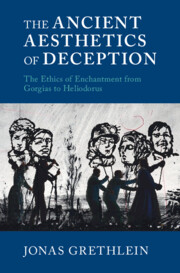Book contents
- The Ancient Aesthetics of Deception
- The Ancient Aesthetics of Deception
- Copyright page
- Contents
- List of Figures
- Acknowledgements
- Chapter 1 Gorgias and the Justice of Tragic Apatē
- Chapter 2 The Circulation and Significance of Apatē in the Classical Era
- Chapter 3 The Dramatic Entanglement of Aesthetic Illusion with Deceit in Sophocles’ Electra
- Chapter 4 Immersion and Corruption in Plato’s Republic
- Chapter 5 The Void of Hellenistic Criticism
- Chapter 6 The Appeal and Challenge of Apatē in Imperial Criticism: Plutarch’s De audiendis poetis
- Chapter 7 Lucian and the Spell of Philosophy
- Chapter 8 How to Read Ekphrasis: The Tabula Cebetis
- Chapter 9 Christian Polemics against Idolatry: Clement of Alexandria’s Protrepticus
- Chapter 10 The Aesthetics of Deception Reconfigured in Heliodorus’ Ethiopica
- Chapter 11 From Deepfake to Psychotherapy: The Aesthetics of Deception Today
- Bibliography
- Index Locorum
- General Index
Chapter 1 - Gorgias and the Justice of Tragic Apatē
Published online by Cambridge University Press: 23 August 2021
- The Ancient Aesthetics of Deception
- The Ancient Aesthetics of Deception
- Copyright page
- Contents
- List of Figures
- Acknowledgements
- Chapter 1 Gorgias and the Justice of Tragic Apatē
- Chapter 2 The Circulation and Significance of Apatē in the Classical Era
- Chapter 3 The Dramatic Entanglement of Aesthetic Illusion with Deceit in Sophocles’ Electra
- Chapter 4 Immersion and Corruption in Plato’s Republic
- Chapter 5 The Void of Hellenistic Criticism
- Chapter 6 The Appeal and Challenge of Apatē in Imperial Criticism: Plutarch’s De audiendis poetis
- Chapter 7 Lucian and the Spell of Philosophy
- Chapter 8 How to Read Ekphrasis: The Tabula Cebetis
- Chapter 9 Christian Polemics against Idolatry: Clement of Alexandria’s Protrepticus
- Chapter 10 The Aesthetics of Deception Reconfigured in Heliodorus’ Ethiopica
- Chapter 11 From Deepfake to Psychotherapy: The Aesthetics of Deception Today
- Bibliography
- Index Locorum
- General Index
Summary
The exploration of the ancient aesthetics of deception takes its cue from Gorgias fr. B 23 DK. After contemplating the fragment in its original contexts – Plutarch cites it in two different treatises – I will argue that Gorgias’ assertion derives its poignancy from the transformation of several topoi. What reads like a mere witticism is the result of a crossing of an epistemological tradition with an ethical paradox and a poetological premise, all under the auspices of aesthetics.
Information
- Type
- Chapter
- Information
- The Ancient Aesthetics of DeceptionThe Ethics of Enchantment from Gorgias to Heliodorus, pp. 1 - 32Publisher: Cambridge University PressPrint publication year: 2021
